- Home
- Harper Lin
Cape Bay Cafe Mystery 10 - Punch, Pastries, and Poison
Cape Bay Cafe Mystery 10 - Punch, Pastries, and Poison Read online
PUNCH, PASTRIES, AND POISON
A Cape Bay Cafe Mystery Book 10
HARPER LIN
Want new Harper Lin ebook releases for 99¢?
Sign up HERE
* * *
This is a work of fiction. Names, characters, organizations, places, events, and incidents are either products of the author’s imagination or are used fictitiously.
Punch, Pastries, and Poison
Copyright © 2021 by Harper Lin.
All rights reserved.
No part of this book may be reproduced, or stored in a retrieval system, or transmitted in any form or by any means, electronic, mechanical, photocopying, recording, or otherwise, without express written permission of the author.
www.harperlin.com
Contents
Chapter 1
Chapter 2
Chapter 3
Chapter 4
Chapter 5
Chapter 6
Chapter 7
Chapter 8
Chapter 9
Chapter 10
Chapter 11
Chapter 12
Chapter 13
Chapter 14
Chapter 15
Chapter 16
Chapter 17
Chapter 18
Chapter 19
Chapter 20
Chapter 21
Chapter 22
Chapter 23
Chapter 24
Chapter 25
Chapter 26
Chapter 27
Recipe 1: Cream Horns
Recipe 2: Shortbread Cookies
Recipe 3: Raspberry Punch
Chapter 1
Late spring is my favorite time of year in Cape Bay. The icy chill of Massachusetts winter is finally out of the air, the trees are back in full leaf, and the humidity and tourist throngs haven’t yet descended on the coast. The feeling is glorious, and I want to spend every second of every day outdoors, soaking it up.
So, naturally, instead of doing that, I was holed up in the back room of Antonia’s, sorting through invoices and poring over resumes.
After nearly a year as sole proprietor of the coffee shop my grandparents had opened sixty-some-odd years ago when they’d first arrived here from Italy, I was ready to make some changes. Okay, maybe I wasn’t actually ready to make them, but I’d found myself increasingly feeling like it was time to change, particularly to bring on new staff.
Antonia’s had been running on a staff of five for a year, since my late mother—the café’s previous owner—had hired two high school students on shortly before her death. That had been enough to get by, but I didn’t want to just get by. I wanted to flourish. And with tourist season coming, flourishing meant I needed some more help.
I looked down again at the resume in front of me. Persephone Phillips. She didn’t have much experience, but I doubted that Becky and Amanda—my high school girls—had much before starting, either, and in any case, I mostly wanted the new person to help with taking orders, running them out to tables, and keeping the place clean. Not exactly rocket science.
I glanced up at the clock on the wall. Persephone should have been here by now. Running late was not exactly the kind of first impression I’d been hoping she’d make.
With a sigh, I picked up the stack of new resumes and applications from the corner of the little table that passed as a desk in the café's back room. I looked down at the first one. Bradford Bradenton Bradshaw IV. He had a master’s degree in finance and a few years of experience working on Wall Street. Why on earth was he applying at my little coffee shop? Did he think I was hiring for a finance manager instead of a cashier? If I was, it would be for probably the least interesting finance job ever, since I had no problem keeping up with our books even though I was a communications major in school.
The next applicant was a girl who had just turned fourteen the week before—she had it written on her application and mentioned it to me when she dropped it off—whose parents had no doubt urged her to go ahead and find a summer job before they were all taken.
I wasn’t completely opposed to hiring a fourteen-year-old. If she was a good fit, I could hope to have her for four good years before she graduated high school. Fourteen—barely fourteen—just seemed so young. I looked back down at the application she’d turned in and gasped when I realized that she hadn’t even started high school yet. She was still in middle school! I reminded myself that her education level had no bearing on her ability to take an order, and I flipped her application over on top of Bradford Bradenton Bradshaw IV’s in the Maybe pile. Middle school!
I was still shaking my head when Sammy—my café manager and general right-hand woman—poked her head through the doorway.
“Sammy, you need to look at the applications I got yesterday.” I grabbed Bradford Bradenton Bradshaw IV and the middle-schooler’s papers from the pile and held them out to her.
“I’d love to”—she held out a single finger—“but your interview is here.”
I glanced up at the clock. She was almost ten minutes late. That irked me, but I didn’t think it was reason enough to dismiss her without even speaking to her. Maybe she’d gotten stuck in traffic or been getting in her car when she realized her blouse had a big grease stain from the pizza she’d dropped on it last time she wore it. Sometimes those didn’t come out in the wash. It happened. I knew from experience.
“What do you think of her?” I asked. “Does she seem like she’d be a good fit?”
Sammy shrugged. “She just came in and said she was here for her interview. I didn’t really talk to her.”
“Did she apologize for being late?”
Sammy gave me a sympathetic smile. “Nobody’s perfect, Fran. No matter how much you’d like them to be.”
I resisted the urge to point out that I couldn’t imagine having a more perfect employee than her and stood up from my chair. “Well, hopefully she’s a good fit, because I’m tired of looking at resumes.”
I followed Sammy out in the café and looked across the counter at the girl she pointed out.
My heart sank.
I was pretty sure a pizza stain on her blouse wasn’t the cause of her lateness. A cat attack seemed more likely. Or a vigorous sword fight.
Under certain circumstances, I could have forgiven her for wearing a T-shirt and jeans to an interview—some people just didn’t know better, and this place was just a coffee shop, after all. The holes were what really got me. I could see at least five in the baggy black T-shirt, one of which was a slash across her abdomen that left a gaping swath of her midriff exposed.
Her acid-washed jeans were similarly scattered with holes. If they hadn’t somehow been still attached to her, I would have thought she ran them through a shredder.
I looked at Sammy imploringly, silently begging her to tell me I was looking at the wrong girl.
Instead, she leaned over and said quietly in my ear, “It’s the fashion.” She inclined her head slightly towards a group of college-aged girls who had set up camp at one of the tables with their laptops, a stack of pastries, and their lattes. Their clothes, too, looked like they’d spent some time at the mercy of a razor.
I sighed and resolved myself to ignoring her outfit. And her lateness. And her hair needing a visit with a comb. I took one more look at Sammy, hoping she’d finally admit that Persephone was a no-show, then walked around the counter to the girl. “Hi, Persephone?” I gave her a warm smile and stuck out my hand. “I’m Fran. It’s a pleasure to meet you.”
She stared down at my hand before slowly taking it, if you could call what she did taking it. It was more like she slipped h
er hand limply into mine and allowed me to attempt to shake it. The second I released it, she pulled it back and wiped it on her jeans.
I clenched my teeth and forced myself to keep smiling. “Why don’t you follow me to the back and we can get started?” I turned and headed for the back, catching Sammy’s eye on the way. I widened my eyes, knowing she’d caught every second of the awkward greeting and attempt at a handshake. She grinned back at me but didn’t make any movement to let me know that this was an elaborate joke, which I was still wishing it was.
My hopes momentarily dashed, I led Persephone to the back, pulled up a chair opposite mine, and sat down, gesturing for her to do the same.
She peered down at it, made a face, brushed off whatever invisible dirt she thought she saw, and sat down, perching on the very edge of the chair.
I gritted my teeth some more, then smiled big. “So, Persephone, what makes you want to work here at Antonia’s?”
I listened to the seconds literally tick away on the little wall clock above my computer. It slowly dawned on me that she hadn’t spoken at all yet. Could she speak? We had arranged the interview by email, so she hadn’t had to speak then. But wouldn’t she have mentioned it? I picked up her application in case she’d written it down there and I just hadn’t noticed. “Um, do we—” I started, wondering if we needed to work out another means of communication. Before I could finish my sentence, she finally spoke up.
“It’s Ephy.”
I looked up at her, trying to figure out what on earth she’d just said. “I’m sorry?”
“It’s Ephy,” she repeated in a monotone. “You keep calling me Persephone, but no one calls me that.”
I forced a smile as I glanced down at the empty spot on the application labeled “nickname.” I held my pen over it. “E-F?”
She stared at me.
I held back a sigh.
“P-H.”
I smiled and nodded. “I?”
She cocked her head to the side with an expression like she thought I was talking nonsense.
“E-P-H-I?” I enunciated each letter.
She heaved a sigh and rolled her eyes. “Why?”
I could feel my smile getting more patronizing by the second. I clenched the pen tighter in my fingers. “I just want to be able to spell your name correctly.”
Again with her condescending look. I resisted the urge to stand up and show her straight to the door. “So, you spell it E-P-H-I?”
“Why?” she asked again, sounding even more irritable.
I was halfway to standing when it clicked. I sank back down in my chair, my face feeling like it was on fire, and wrote down the letter Y at the end of her name. She hadn’t been being difficult at all. She was spelling her name just as I asked. No wonder she was looking at me like I’d lost my mind. “Oh, of course, sorry about that.” I smiled again, deciding I was going to have a new attitude towards her and the interview. “So, what makes you want to work here?”
“I, like, really like coffee and stuff?”
So much for the new attitude. “Have you ever used a professional-grade espresso machine?”
“Yeah?”
“What kind?”
She rattled off a list of high-end espresso machines, some of which even I hadn’t even used.
I was surprised. I looked again at her resume, which definitely didn’t list any coffee shop experience. “Have you worked in a coffee shop before?”
She shrugged as her eyes wandered the room. “Just filling in for people? Like, my friends and stuff?”
I nodded, but I was skeptical. Hiring someone who needed to be taught how to use the machine from the bottom up would give me more work to do, not less. And if she needed to learn that from scratch, I’d probably have to teach her how to make all the drinks too. Between her attitude and her lack of experience, it wasn’t looking good for her. But I was afraid I wasn’t giving her a fair chance. I’d already leapt to a conclusion about her once. I’d never been responsible for hiring before, and I didn’t want to screw it up. I needed help—good help—in the café, and I wouldn’t get it by cutting interviews off after a couple of questions.
I took a deep breath and, despite my better judgement, plowed ahead.
Chapter 2
The rest of the interview actually wasn’t a disaster. Not completely anyway. Her answers to my questions always seemed to end in a question mark, but they were reasonable. And she actually had a good response to how she would handle a crowded café with refills, orders, and dirty tables all needing attention. But as I led her out to the espresso machine to test out the skills I was highly skeptical she had, I didn’t think she was going to get the job. “Here you go.” I waved at the machine with all its dials and knobs and gauges. “Make me whatever you want.”
She nodded silently as she looked it over. She touched a couple of the dials but didn’t change them. Then she peeked at the grounds in the portafilter, waving her hand over them and sniffing. “Where are your beans?” she asked, still examining the machine.
“Grounds are right there.” I gestured at the airtight jar beside the drip coffee maker. It was a test. She might have spent a little time in a coffee shop, and she might have even pulled espresso shots. But plenty of people could dump beans into an automatic espresso machine and pull a lever or two to get coffee out. I wanted to see what else she knew.
She wrinkled her nose. “The beans for espresso?”
I held back the smile that desperately wanted to creep across my face. “Behind you.”
She turned around and picked up one. “You roast your own, right? When did you do these?”
“Yes. Those are from this morning.”
She shook her head and put the bag down. “Do you have any from, like, yesterday? Like, yesterday morning?”
My smile broke through. I nodded in the direction of the bags of beans farther down the counter.
Ephy picked up one of the older bags and held it to her nose. “What’s the blend?”
“Single-origin Kona. They have labels on the bottom.”
She flipped the bag over and read the label before setting the bag down. She examined several other bags and then came back to the Hawaiian. “Grinder?”
I pointed it out with my stomach clenched. Those Kona beans were the most expensive ones we had in stock. They were so precious to me, I had roasted them myself the day before instead of letting Sammy handle it like she did most of the beans. I was hesitant to let her use them, even though it was only a small bag. What if she ruined them? What if she used the whole bag and didn’t even make a useable grind? I pressed my nails into the palms of my hands and didn’t say a word.
Ephy opened the bag and sniffed it, closing her eyes. She nodded and poured the beans into the grinder—not all of them but more than she needed to. I held my breath. If she ground them the way you typically would a Kona, they would be all wrong for espresso. I couldn’t believe how nervous I was, both for her and for my precious beans.
Fortunately for both the coffee and me, she got the perfect grind then turned back to the semi-automatic espresso machine. She loaded up the basket with the fresh grounds then popped it into the machine. With smooth movements, she adjusted everything to her liking and pulled a shot. Instead of handing it to me, she took a sip and nodded. Then she pulled two more shots in quick succession. She added milk to one of the cups, giving her wrist a slight flick, then put them both on the counter in front of me.
“A straight shot and a flat white. I wanted you to be able to get the true flavor of the espresso, and then I figured you’d want to see my milk skills, so I made the flat white. It’s, like, really simple, so you can still taste the bean, you know? It’s kind of chocolatey, and that’s, like, one of the highlights of Kona.”
I blinked at her for a few seconds, mildly impressed with her knowledge of the bean’s flavor profile, before I remembered that the taste of the espresso mattered a lot more than her book knowledge of coffee. She could have the technical aspec
ts of making espresso down pat and still fail miserably in her execution. Kind of like my boyfriend Matt and pretty much any sport—he loved them all and knew everything about all of them but couldn’t play for the life of him.
I picked up the flat white first, deliberately leaving the shot for later. That flick of her wrist as she poured in the milk had been her decorating the drink with a delicate, pretty heart. It was just what I liked to see. Yet again, I reminded myself that, no matter how much I liked a pretty drink, the taste was what really mattered. I brought the cup towards my nose and sniffed it. The aroma was perfect and set my mouth watering, but I forced myself to be patient. I tipped the cup toward me and gave it the slightest swirl so I could get a better look at the color and consistency. It was a beautiful dark caramel. So far, a drink that I would be proud to have made myself.
I finally brought the cup to my lips, took a sip, and swished the coffee around my mouth for a few seconds before swallowing. The taste was near-heavenly, everything I looked for in a good cup of Kona—bright and fruity with a touch of acid and a hint of chocolate. I’d already seen enough to feel confident that I understood her coffee skills, but I still wanted to follow through on the final test—the espresso.
As much as I wanted to finish the flat white, I put it down and looked at the small cup still sitting on the counter. “How long do you think that’s been sitting there?”
Ephy shrugged.
“A minute or so, you think?”
Her eyes turned down to the cup then back to me. She shrugged again.
“You think that’s okay? Kind of a while for an espresso, don’t you think?” This was also a test. There was a school of thought that you couldn’t leave a shot of espresso sitting for more than thirty seconds before it turned irretrievably bitter. I thought that was ridiculous. A good bean, properly roasted and properly brewed, should still taste just as delicious cold as it did fresh out of the machine. In fact, as far as I was concerned, if it didn’t taste good cold, it hadn’t actually been good fresh either.

 Love and Murder in Savannah
Love and Murder in Savannah Cremas, Christmas Cookies, and Crooks
Cremas, Christmas Cookies, and Crooks Pawsibly Murdered
Pawsibly Murdered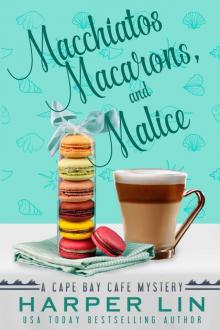 Macchiatos, Macarons, and Malice
Macchiatos, Macarons, and Malice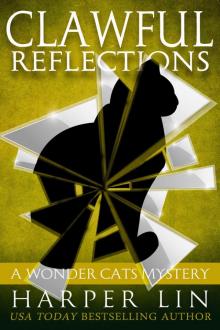 Clawful Reflections
Clawful Reflections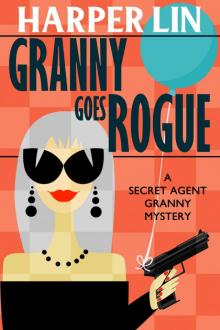 Granny Goes Rogue
Granny Goes Rogue Sugar and Scandals
Sugar and Scandals Cape Bay Cafe Mystery 10 - Punch, Pastries, and Poison
Cape Bay Cafe Mystery 10 - Punch, Pastries, and Poison Desserts and Death
Desserts and Death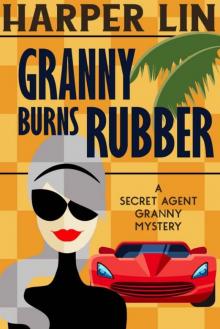 Secret Agent Granny 10 - Granny Burns Rubber
Secret Agent Granny 10 - Granny Burns Rubber Punch, Pastries, and Poison
Punch, Pastries, and Poison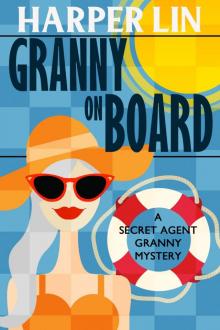 Granny on Board
Granny on Board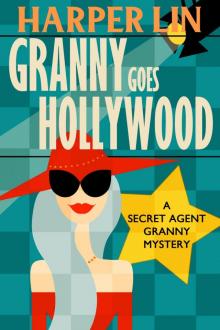 Granny Goes Hollywood
Granny Goes Hollywood Chocolat Chaud Murder
Chocolat Chaud Murder Lattes, Ladyfingers, and Lies
Lattes, Ladyfingers, and Lies Cappuccinos, Cupcakes, and a Corpse
Cappuccinos, Cupcakes, and a Corpse Bake Sale for Murder
Bake Sale for Murder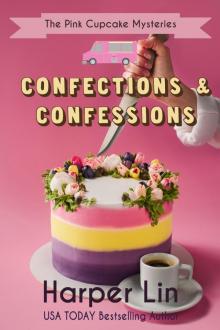 Confections and Confessions
Confections and Confessions Purr-suasive Witches (A Wonder Cats Mystery Book 11)
Purr-suasive Witches (A Wonder Cats Mystery Book 11)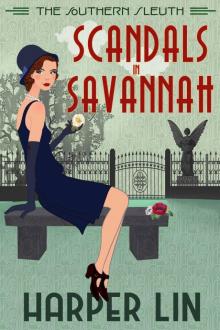 Scandals in Savannah
Scandals in Savannah Granny Goes Wild
Granny Goes Wild Granny Gets Fancy
Granny Gets Fancy Croissant Murder (A Patisserie Mystery with Recipes)
Croissant Murder (A Patisserie Mystery with Recipes) Double Shots, Donuts, and Dead Dudes
Double Shots, Donuts, and Dead Dudes Margaritas, Marzipan, and Murder
Margaritas, Marzipan, and Murder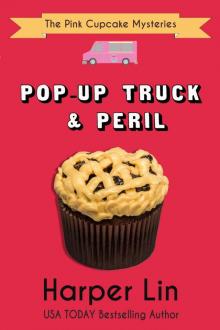 Pop-Up Truck and Peril
Pop-Up Truck and Peril Harper Lin - Patisserie 06 - Crème Brûlée Murder
Harper Lin - Patisserie 06 - Crème Brûlée Murder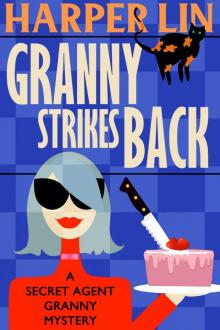 Granny Strikes Back
Granny Strikes Back Lattes, Ladyfingers, and Lies (A Cape Bay Cafe Mystery Book 4)
Lattes, Ladyfingers, and Lies (A Cape Bay Cafe Mystery Book 4) Margaritas, Marzipan, and Murder (Cape Bay Cafe 3)
Margaritas, Marzipan, and Murder (Cape Bay Cafe 3) Un-fur-tunate Murders
Un-fur-tunate Murders Cappuccinos, Cupcakes, and a Corpse (A Cape Bay Cafe Mystery Book 1)
Cappuccinos, Cupcakes, and a Corpse (A Cape Bay Cafe Mystery Book 1)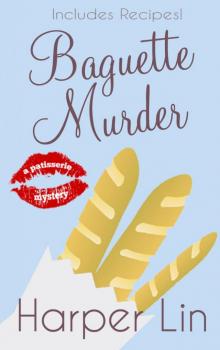 Baguette Murder: Book 3 (A Patisserie Mystery with Recipes)
Baguette Murder: Book 3 (A Patisserie Mystery with Recipes) 03 Food Festival and a Funeral
03 Food Festival and a Funeral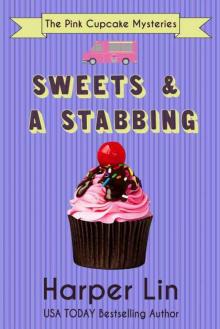 Sweets and a Stabbing (The Pink Cupcake Mysteries Book 1)
Sweets and a Stabbing (The Pink Cupcake Mysteries Book 1) A Deadly Bridal Shower (The Pink Cupcake Mysteries Book 2)
A Deadly Bridal Shower (The Pink Cupcake Mysteries Book 2) 04 Cold Case and Cupcakes
04 Cold Case and Cupcakes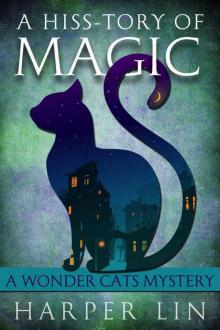 1 A Hiss-tory of Magic
1 A Hiss-tory of Magic 2 Éclair Murder
2 Éclair Murder The Scariest Tail (A Wonder Cats Mystery Book 4)
The Scariest Tail (A Wonder Cats Mystery Book 4) Opera Cake Murder (A Patisserie Mystery with Recipes Book 8)
Opera Cake Murder (A Patisserie Mystery with Recipes Book 8)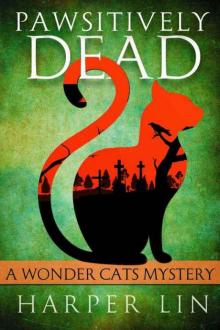 Pawsitively Dead (A Wonder Cats Mystery Book 2)
Pawsitively Dead (A Wonder Cats Mystery Book 2) Harper Lin - Patisserie 07 - Madeleine Murder
Harper Lin - Patisserie 07 - Madeleine Murder Cat-astrophic Spells
Cat-astrophic Spells Purr-fect Getaway (A Wonder Cats Mystery Book 5)
Purr-fect Getaway (A Wonder Cats Mystery Book 5)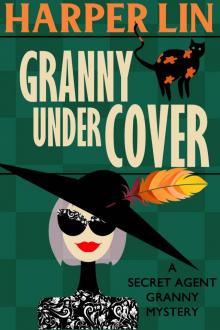 Granny Undercover (Secret Agent Granny Book 2)
Granny Undercover (Secret Agent Granny Book 2)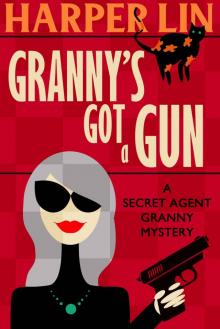 Granny's Got a Gun (Secret Agent Granny Book 1)
Granny's Got a Gun (Secret Agent Granny Book 1)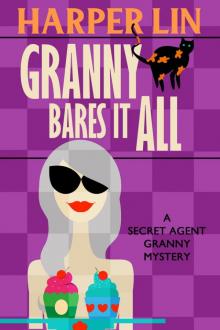 Granny Bares It All
Granny Bares It All Fur-boding Shadows
Fur-boding Shadows Fur-miliar Felines
Fur-miliar Felines